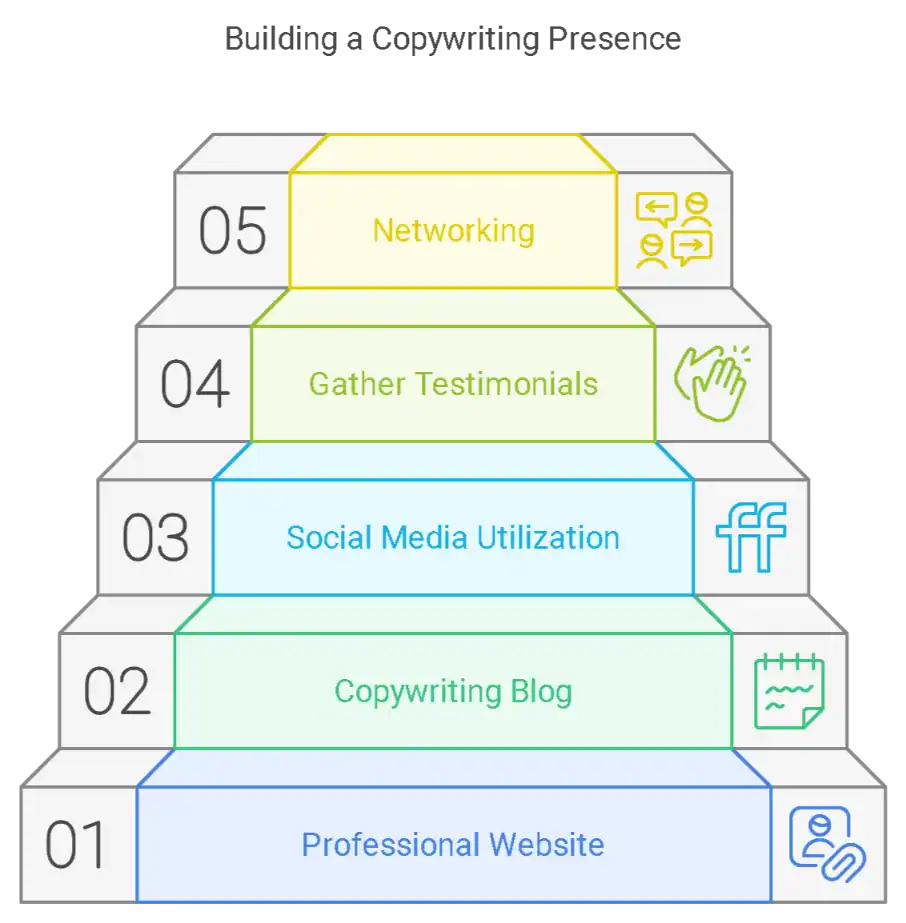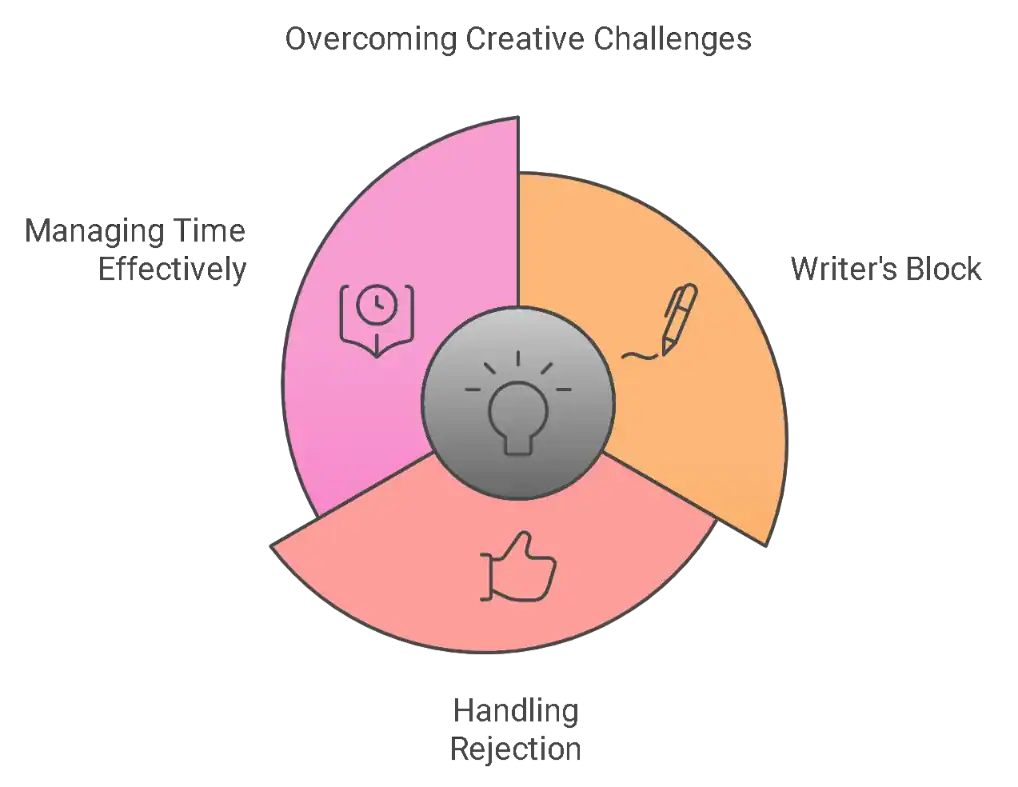Copywriting: 7-Step Guide to Transition from Blogging (2025)
Learn how to make a successful transition from blogging to copywriting. This guide covers key skills, actionable steps, and real-world examples to help you start your copywriting journey.
Are you a blogger looking to expand your horizons? Transitioning from blogging to copywriting is a natural step that can open up new career opportunities. While blogging and copywriting both involve writing, they serve different purposes and require distinct skill sets.
This practical guide will help you navigate the shift, leveraging your existing talents to become a successful copywriter.
Understanding the Shift: Blogging vs. Copywriting
Blogging
As a blogger, you create blog posts to inform, entertain, or engage your readers. Blogging is often about sharing personal experiences, insights, or expertise on a topic. The tone is usually conversational, aiming to build a connection with your audience.
Copywriting
Copywriting focuses on persuading the audience to take a specific action, such as making a purchase, signing up for a newsletter, or downloading a resource. It involves crafting compelling copy that motivates and inspires action.
Key Differences
| Aspect | Blogging | Copywriting |
|---|---|---|
| Purpose | Educate or entertain readers | Persuade and prompt action |
| Tone | Informal and conversational | Persuasive and strategic |
| Content Length | Longer blog posts (e.g., 1,000+ words) | Varies; can be short (ads) or long (sales pages) |
| SEO Focus | Important for visibility | Critical for targeted traffic |
| Goal | Build readership and engagement | Drive conversions and sales |
Key Skills Required for Effective Copywriting
Transitioning to copywriting requires developing new skills while applying your existing writing abilities.
- Understanding Your Audience
- Know Your Readers: Deeply understand the needs, desires, and pain points of your target audience.
- Create Buyer Personas: Develop profiles of your ideal customers to tailor your copywriting effectively.
- Persuasive Writing Techniques
- Craft compelling headlines: Use attention-grabbing titles to draw in readers.
- Focus on Benefits: Highlight how the product or service solves problems or improves lives.
- Include Strong Calls to Action (CTAs): Encourage immediate action from your audience.
- SEO Copywriting
- Keyword Research: Identify relevant keywords to improve search engine rankings.
- Optimize Content: Incorporate keywords naturally into your copy without sacrificing readability.
- Content Strategy Development
- Plan Ahead: Create a roadmap for your content marketing efforts.
- Align with Business Goals: Ensure your copywriting projects support overall objectives.
- Technical Skills
- Adaptability: Write across various formats, such as social media, emails, and landing pages.
- Editing and Proofreading: Deliver polished, error-free written content.
- Emotional Intelligence
- Connect Emotionally: Tap into the emotions of your readers to make your copy more engaging.
- Storytelling: Use narratives to make the message memorable.
Actionable Steps to Transition from Blogging to Copywriting
1. Build a Strong Portfolio
Your portfolio is your showcase to potential clients.
- Include Diverse Samples: Showcase your ability to write different types of copy, such as:
- Website Copy
- Sales Pages
- Email Campaigns
- Social Media Ads
- Transform Existing Blog Posts: Turn some of your top blog posts into persuasive copywriting samples.
- Highlight Results: If available, include metrics like increased traffic, higher engagement, or conversion rates.
Portfolio Checklist
| Item | Description |
|---|---|
| Professional Bio | Share your journey from blogging to copywriting. |
| Contact Information | Make it easy for clients to reach you. |
| Testimonials | Include feedback from previous clients or employers. |
| Case Studies | Provide detailed examples of successful copywriting projects. |
2. Find Clients
Building a client base is crucial for your copywriting business.
- Leverage Freelance Platforms: Join sites like Upwork or Freelancer to find copywriting projects.
- Network on Social Media: Use platforms like LinkedIn to connect with potential clients and showcase your expertise.
- Attend Industry Events: Participate in webinars, workshops, or conferences related to content marketing and copywriting.
- Cold Outreach: Reach out directly to businesses that might need your copywriting services.
3. Set Your Rates
Pricing your services appropriately is essential.
- Research the Market: Understand the standard rates for different types of copywriting work.
- Consider Your Experience: As a newcomer, you might start with competitive rates and increase them as you gain experience.
- Offer Packages: Create bundles (e.g., a series of blog posts or a set number of social media captions) to provide value.
Sample Rate Guide
| Service | Beginner Rate | Experienced Rate |
|---|---|---|
| Website Copy | $50 – $100 per page | $150 – $300 per page |
| Blog Posts | $30 – $80 per post | $100 – $200 per post |
| Social Media Content | $20 – $50 per post | $60 – $120 per post |
| Email Newsletters | $40 – $90 per email | $100 – $250 per email |
4. Market Your Copywriting Services
Effective marketing helps attract the right clients.
- Create a Professional Website: Develop a site to showcase your portfolio and services. Ensure it’s optimized for SEO to increase visibility.
- Start a Copywriting Blog: Share insights, tips, and experiences related to copywriting to establish authority.
- Utilize Social Media: Platforms like Twitter and Instagram can help you reach a broader audience. Share your work and engage with others.
- Gather Testimonials: Positive feedback from clients builds trust and credibility.
- Network with Other Professionals: Connect with content marketers, designers, and other freelance writers for potential collaborations.
Real-World Examples and Case Studies
Case Study 1: Emily’s Journey from Blogger to Copywriter
Background: Emily was a content writer who maintained a health and wellness blog.
Action:
- Skill Development: She took online courses in SEO copywriting and persuasive writing.
- Portfolio Building: Transformed her informative blog posts into persuasive sales copy samples.
- Networking: leveraged LinkedIn to connect with health brands.
Result: Emily landed several clients in the wellness industry, providing copywriting services for their websites and marketing materials.
Case Study 2: James’ Success in Technical Copywriting
Background: James was a tech blogger with a knack for explaining complex concepts.
Action:
- Specialization: Choose to focus on technical copywriting in the software industry.
- Portfolio Expansion: Created samples like user guides and technical product descriptions.
- Marketing Strategy: Started a copywriting blog sharing tips on writing technical content.
Result: James became a sought-after professional copywriter, known for delivering valuable content that resonates with a technical audience.
Additional Tips for a Smooth Transition
Embrace Continuous Learning
- Take courses: Invest in courses on copywriting techniques, psychology, and marketing.
- Read Widely Explore books, blogs, and articles by successful copywriters.
Join Professional Communities
- Networking Groups: Join forums or groups dedicated to copywriting and content marketing.
- Attend workshops: Engage in events to learn from industry experts and stay updated on trends.
Utilize Tools and Resources
- Grammarly Premium: Enhance your writing skills and produce error-free copy. Check out our review: Grammarly Premium Review: Leverage Your Writing
- SEO Tools: Use keyword research tools to optimize your copywriting for search engines.
- Project Management Software: Stay organized with tools like Trello or Asana, especially when juggling multiple copywriting projects.
Common Challenges and How to Overcome Them
Facing Writer’s Block
- Solution: Take breaks, engage in creative activities, or switch topics to reignite inspiration.
Handling Rejection
- Solution: View feedback as an opportunity to improve. Keep refining your skills and portfolio.
Managing Time Effectively
- Solution: Set clear schedules, prioritize tasks, and avoid overcommitting.
Frequently Asked Questions
1. Can I be both a blogger and a copywriter?
Absolutely! Many professionals successfully manage both blogging and copywriting, allowing them to diversify their income streams.
2. Do I need formal education in copywriting?
While formal education can be beneficial, many copywriters are self-taught. Practical experience and a strong portfolio often hold more weight.
3. How can I improve my persuasive writing skills?
- Practice Regularly: Write different types of copy.
- Study Successful Copy: analyze ads, sales pages, and engaging content.
- Learn from Experts: Read books or take courses from seasoned copywriters.
4. What’s the difference between a content writer and a copywriter?
- Content Writer: focuses on creating informative or educational content, like blog posts or articles.
- Copywriter: Specializes in persuasive writing aimed at prompting action.
5. How important is SEO in copywriting?
Very important. SEO copywriting ensures your copy reaches the intended audience by ranking higher in search engine results.
Conclusion
Transitioning from blogging to copywriting is a rewarding journey that expands your writing skills and opens up new opportunities. By understanding the key differences, developing necessary skills, and actively marketing yourself, you can establish a successful career as a copywriter.
Embrace the challenge, continue learning, and leverage your unique voice to create effective copywriting that resonates with audiences and drives results.
Related Posts You Might Enjoy
- How to Successfully Transition into Copywriting
- A Guide to Copyediting vs. Copywriting
- Mastering SEO Best Practices
- Boost Your Affiliate Earnings with Perplexity AI
- How to Create Evergreen Content
Final Thoughts
Your journey from blogging to copywriting is not just a career change but an opportunity to make a greater impact with your writing. By honing your copywriting skills and understanding the art of persuasion, you can create engaging content that not only informs but also inspires action.
Ready to embark on your copywriting adventure? Start today by applying these steps and watch your career flourish!
References and Further Reading
- Write Evergreen Content: Learn how to create content that stands the test of time.
- Mastering SEO Best Practices: Enhance your understanding of SEO to improve your copywriting.
- Promote Your Blog to Increase Traffic—Strategics to Expand Your Reach.
- Content marketing must educate and convert the customer—insights into creating content that converts.
- Boost Your Affiliate Earnings with Perplexity AI: Explore advanced tools to enhance your copywriting.
If you found this guide helpful, subscribe to our newsletter for more tips on copywriting, content marketing, and blogging strategies. Join a community of skilled copywriters and stay ahead in the ever-evolving world of writing.
This post was brought to you by Affiliate Marketing for Success, your go-to resource for mastering the art of online marketing and copywriting.
I’m Alexios Papaioannou, an experienced affiliate marketer and content creator. With a decade of expertise, I excel in crafting engaging blog posts to boost your brand. My love for running fuels my creativity. Let’s create exceptional content together!












